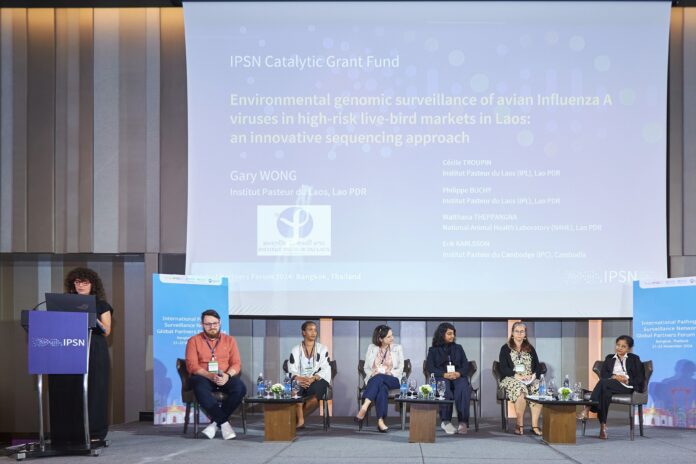GENEVA, Switzerland – The World Health Organization (WHO) and partners announced ten projects that will receive almost US$ 2 million in grants to improve capacities in pathogen genomic surveillance.
The catalytic grant fund was established by the International Pathogen Surveillance Network (IPSN) to support partners from low- and middle-income countries to build their capacities in pathogen genomic analysis. This technology analyses the genetic code of viruses, bacteria and other disease-causing organisms to understand, in conjunction with other data, how easily they spread, and how sick they can make people. This data allows scientists and public health teams to track and respond to infectious disease threats, supports the development of vaccines and treatments and empowers countries to take faster decisions.
The fund is hosted by the United Nations Foundation and supported by the Bill & Melinda Gates Foundation, The Rockefeller Foundation and Wellcome.
“The IPSN catalytic grant fund has incredible potential to expand pathogen genomic surveillance for all, which we are already seeing through the first round of grantmaking,” said Sara Hersey, Director of Collaborative Intelligence at the WHO Hub for Pandemic and Epidemic Intelligence. “We are eager to support this work, which plays a key role in pandemic and epidemic prevention worldwide.”
“The IPSN catalytic grant fund recipients will accelerate the benefits of pathogen genomic surveillance in low- and middle-income settings, as well as explore new applications for genomic surveillance, such as wastewater surveillance,” said Manisha Bhinge, vice president of the health initiative at The Rockefeller Foundation.
“Pandemics and epidemics continue to be a global threat, further amplified by climate change. There is urgent need for equitable access to these tools and capabilities to protect lives in vulnerable communities.”
One of the recipients, the American University of Beirut, will use wastewater surveillance to study how diseases spread in refugee populations, helping to ensure that people can quickly receive the care and support they need in migration settings. Another grantee, the Pasteur Institute of Laos, will use the funding to develop new methods to track avian flu in live-bird markets, a setting that is often overlooked but vital to millions of people worldwide.
“If we are to protect vulnerable populations from the devastating impacts of disease, we first need to better understand how these pathogens spread, evolve and cause illness. These projects, developed in-country and tailored to local priorities, will generate new insights, knowledge and evidence that will help track global pathogen trends and inform evidence-based decisions to implement effective interventions” said Titus Divala, interim head of epidemics and epidemiology at Wellcome.
The Federal University of Rio de Janeiro in Brazil will use the funding to develop an open-source bioinformatics tool that can be used to conduct offline analyses. The tool will be piloted in Latin America with potential for global use, especially in low-resource settings.
“SARS-CoV-2 and subsequent regional disease outbreaks have underscored the importance of access to genomic surveillance tools in all countries. The IPSN’s catalytic investments will generate data and innovative methods to support the much-needed scale-up in LMICs,” said Simon Harris of the Gates Foundation.
The grantees were announced at the IPSN Global Partners Forum held in Bangkok, Thailand, from 21–22 November. The event was co-hosted by the WHO Regional Offices for South-East Asia and the Western Pacific and the Centre for Pathogen Genomics at the Doherty Institute in Australia.
A second round of catalytic grant funds will be made available to IPSN members in 2025.





